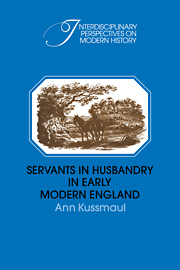Book contents
- Frontmatter
- Contents
- List of figures
- List of tables
- TO MY PARENTS
- Preface
- Part I Servants and labourers
- Part II Form and practice
- Part III Change
- 6 Cycles: 1540–1790
- 7 Extinction
- Appendix 1 ‘Servants’ and ‘labourers’ in early modern English
- Appendix 2 Age and sex
- Appendix 3 Legal control of mobility
- Appendix 4 Statute Sessions and hiring fairs in England, sixteenth to nineteenth centuries
- Appendix 5 The Holland, Lincolnshire, Statute Sessions
- Appendix 6 Compulsory service
- Appendix 7 Speculations on the origin of the institution
- Appendix 8 The 1831 census
- Notes
- Bibliography
- Index
- Frontmatter
- Contents
- List of figures
- List of tables
- TO MY PARENTS
- Preface
- Part I Servants and labourers
- Part II Form and practice
- Part III Change
- 6 Cycles: 1540–1790
- 7 Extinction
- Appendix 1 ‘Servants’ and ‘labourers’ in early modern English
- Appendix 2 Age and sex
- Appendix 3 Legal control of mobility
- Appendix 4 Statute Sessions and hiring fairs in England, sixteenth to nineteenth centuries
- Appendix 5 The Holland, Lincolnshire, Statute Sessions
- Appendix 6 Compulsory service
- Appendix 7 Speculations on the origin of the institution
- Appendix 8 The 1831 census
- Notes
- Bibliography
- Index
Summary
It seemed like a revival of the good old times, but it was really a continuance of them, the practice had never been intermitted … Modern habits of society are, however, unhappily incompatible with this beneficial intercourse, and the practice is dying out.
But Don, still a young man, does not consider it to be a dying trade. He continued: ‘It is a specialised trade but it isn't a dying trade. It is only dying in respect of people not coming into it – the trade is still there.’
Individuals decay and die; species become extinct. Servants in husbandry were creatures of the early modern economy; the institution of service was imbedded in a matrix of agricultural practices and social organization. They were agents in the growth in the size of farms and in a revolution in agricultural practices at a time when the supply of full-time adult labourers was unreliable, and were victims of the growth they helped procure. Service flourished in most of early modern England, but by the mid nineteenth century it had been nearly extinguished in the south and east.
The conditions for the extinction had been laid down in the century before 1750. What began simply as a second cycle in the incidence of service, twin to the decline of the early seventeenth century, became, by 1815, a rout.
The new cyclical downturn was set off by the rise in population, the cost of living, and grain prices at mid century.
- Type
- Chapter
- Information
- Servants in Husbandry in Early Modern England , pp. 120 - 134Publisher: Cambridge University PressPrint publication year: 1981
- 1
- Cited by



